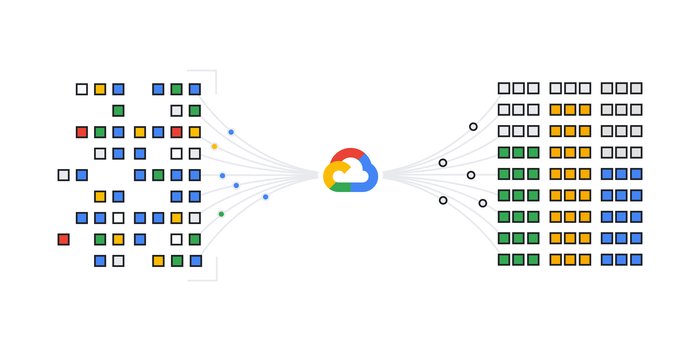Nuclera aims to accelerate drug discovery with Google DeepMind AlphaFold2 on Vertex AI
Gordon McInroy
Co-Founder & CTO, Nuclera
Michael Chen
Co-Founder & CEO, Nuclera
Nuclera, a UK and US-based biotechnology company, is collaborating with Google Cloud to serve the life science community, marrying Nuclera’s rapid protein access benchtop system with Google DeepMind’s pioneering protein structure prediction tool, AlphaFold2 (ref 1) served on Google Cloud’s Vertex AI machine learning platform.
With proteins representing 95% of drug targets, the demand to obtain multiple active protein variations to aid in drug discovery is constantly increasing. In particular, reliable protein structure prediction is a prerequisite for compound/biologics lead development.
The breakthrough AI tool, AlphaFold2 (released by DeepMind in 2021), has thrilled the structural biology and drug discovery communities in recent years by taking a huge leap forward in protein structure prediction accuracy (ref 2).
This coming together of technologies from Nuclera and Google presents a new integrated system for drug developers to optimize protein construct design to accelerate their drug discovery process. High quality structures in minutes to hours will soon be a reality, enabling laser-guided protein design. Additionally, reliable structures for proteins thought “impossible” to characterize experimentally will be made accessible.


Making protein that matters
Accessibility of proteins for lab-based research is fundamental to drug discovery, and is notoriously difficult and expensive to achieve, meaning time and resource limitations are imposed on research potential.
Nuclera is motivated to better human health by making proteins accessible, enabling life science researchers to obtain active proteins from DNA through its benchtop eProtein Discovery system (see Figure 1). Nuclera’s technology integrates cell-free protein synthesis and digital microfluidics on Smart Cartridges, allowing rapid progress on protein projects through an automated, high-throughput, benchtop protein access system.
How AlphaFold2 fits within Nuclera - guided protein design
Widely hailed as a breakthrough in biological research and a leap in the development of vaccines and synthetic materials, AlphaFold2 is an AI model developed by DeepMind for predicting the 3D structure of a protein based on its 1D amino acid sequence.
AlphaFold2 running on Google Cloud’s Vertex AI is set to become an integral feature in Nuclera’s cloud based software, to improve the quality and obtainability of proteins. Currently Nuclera’s cloud software allows their customers to make informed decisions from expression and purification screen results to identify optimal protein constructs to scale up as well as optimal conditions to scale up proteins. The integration of AlphaFold2 into the eProtein Discovery Software increases the quality of constructs screened on the system by offering an addition in silico filter during the experiment design phase, which translates to a higher probability of identifying a truly optimal target protein on which to build discovery programs. Furthermore, AlphaFold2 will help eProtein Discovery users gain deep insights into possible target protein constructs, including any impacts on drug interactions, structural features, and folding.
Implementation of Alphafold2 on Vertex AI pipelines
While the immense power of the AlphaFold2 algorithm is undeniable, it is important to note that Alphafold2 requires serving infrastructure and an operational model.
Generating a protein structure prediction is a computationally-intensive task. Running inference workflows at scale can be challenging — these challenges include optimizing inference elapsed time, optimizing hardware resource utilization, and managing experiments.
The Vertex AI solution for AlphaFold 2 is designed for inference at scale by focusing on the following optimizations:
- Optimizing inference workflow by parallelizing independent steps.
- Optimizing hardware utilization (and as a result, costs) by running each step on the optimal hardware platform. As part of this optimization, the solution automatically provisions and deprovisions the compute resources required for a step.
- Describing a robust and flexible experiment tracking approach that simplifies the process of running and analyzing hundreds of concurrent inference workflows.
Nuclera will use the Vertex AI platform as a foundation for a scalable and resource-efficient AlphaFold pipeline, as well as other Google Cloud services to expose the pipeline through an API and integrate it with its eProtein Discovery system.
What’s involved with the implementation set-up?
The first objective that AlphaFold2 and Nuclera will achieve kicks off with creating a scalable API service that accesses an execution of AlphaFold2 in Google Cloud. Second, an analytics dashboard will be built which allows users to visually and quantitatively compare predicted 3D structures for protein variants. Third, a protein of interest (POI) recommendation feature will propose possible synthetic protein variants (isoforms, truncations, mutations, orthologs or fusions) to customers using intelligent selection algorithms, taking into account various constraints such as computationally generated scores or conserved domains.
eProtein Discovery/AlphaFold2 - its application significance
The 3D structural insights provided by AlphaFold2 will enable Nuclera and its customers to optimize their protein variation synthesis process and gain deeper insights into the interactions between residues and the 3D folding protein structure.
eProtein Discovery customers worldwide will benefit from the composite predictions delivered in the AlphaFold2 module in the eProtein Discovery Software to build a clearer understanding of their proteins, making faster informed decisions that will ultimately economize on time taken for progress in academic research and drug discovery success.
Shweta Maniar, Global Director, Healthcare & Life Sciences Solutions, Google Cloud,commented that, “AlphaFold2 integrated with Nuclera's eProtein Discovery System is a really exciting demonstration of its practical use in drug discovery, enabling researchers to rapidly and efficiently design and produce proteins with the desired structure and function..”
In partnership with Google Cloud and the awesome capabilities of AlphaFold2, we’re excited to be pioneering AI/ML-assisted drug discovery tools, which we believe will bring forth next-generation therapies at a greater pace than ever before. To learn more and to try out this solution, check our GitHub repository, which contains the components and universal and monomer pipelines. The artifacts in the repository are designed so that you can customize them. In addition, you can integrate this solution into your upstream and downstream workflows for further analysis. To learn more about Vertex AI, visit the product page.
References
1. Jumper, J., Evans, R., Pritzel, A. et al. Highly accurate protein structure prediction with AlphaFold. Nature 596, 583–589 (2021). https://doi.org/10.1038/s41586-021-03819-2
2. Ghadermarzi, S., Li, X., Li, Mi, et al. Sequence-Derived Markers of Drug Targets and Potentially Druggable Human Proteins. Front. Genet., 10, 1-18 (2019). https://www.frontiersin.org/articles/10.3389/fgene.2019.01075/full




